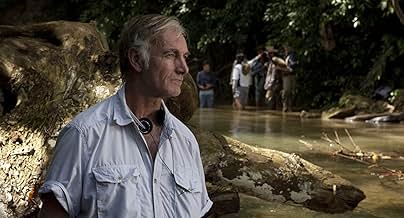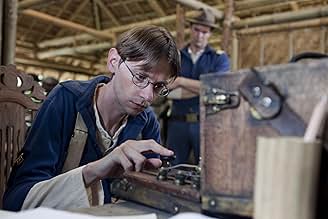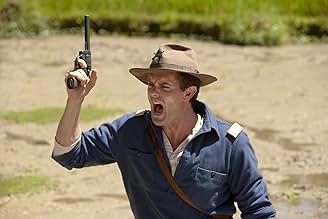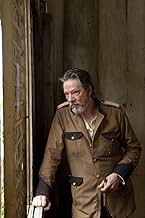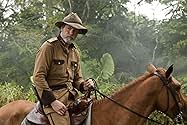A fictional account of events during the Philippine-American War.A fictional account of events during the Philippine-American War.A fictional account of events during the Philippine-American War.
- Awards
- 1 win & 9 nominations total
Hoffman Cheng
- Chop-Chop
- (as Sai Ho Cheng)
Reymart Colestines
- Malpulgas
- (as Raymart Colestines)
Miguel Faustmann
- Captan Narvaez
- (as Miguel Faustman)
- Director
- Writer
- All cast & crew
- Production, box office & more at IMDbPro
Featured reviews
Being an American, I have taken my fair share of history courses and studied many of the wars America has been in ever since it's formation and eventual birth in 1776. Just like everyone else, I leaned about Francis Scott Keys and the thirteen original colonies, but above all that, I also learned about the many events and politics which led to our independence. In school, they teach us about WWI and WWII as well as The Civil War, The revolution, the French and Indian War, etc etc. However, as history is so big and vast it well comes down to the perspective of how it is written and how one receives it.
John Sayles has taken on an incredible project. He has done something only one other filmmaker has done, and portrayed all his characters and events in a very different perspective. I say we learn about all the big wars and we always root for America, but Sayles brings to the big screen something that even today we hold in contention, which is the right for one country to invade another. The Philippine-American war is something any American can say they've never heard of (for the most part). It is a part of history America never looks back at, and there are reasons why. Sayles chooses to show America as the invader; the people who don't belong in the situation at hand (such as the War in Iraq), and it is a very intriguing perspective.
The story focuses on a small garrison of American soldiers who have taken post at a small baryo in the Philippines. We're introduced to a whole array of characters with very solid acting behind them all. There are great turns by DJ Qualls, Dane DeHann, Lucas Neff, and Brian Lee Franklin supported by the promising Garrett Dillahunt and always wonderful Chris Cooper. But above them all Joel Torre steals the show as the main character, Rafael, who is also what the title refers too.
Sayles masterfully crafts scene after scene and leads us through a captivating story. Throughout the film, Sayles makes us wonder, "Who is right?" or "What if both sides are right?", while there is a heavy wondering of God and if doing what God says justifies your actions. But then, what about personal choice or following your heart? Between Rafael and his rebellious son, there is a rift. His son helps the colonials, while Rafael is restricted to do what he wishes and must follow the American law that resides.
This is a film I recommend to all who enjoy the 'forgotten' parts of history. What Sayles has done here is another remarkable job of writing and directing while also serving another very unique perspective to the events which happened during the Philippine- American War. It's wonderful storytelling that leads to another well-crafted and haunting John Sayles-esque ending.
John Sayles has taken on an incredible project. He has done something only one other filmmaker has done, and portrayed all his characters and events in a very different perspective. I say we learn about all the big wars and we always root for America, but Sayles brings to the big screen something that even today we hold in contention, which is the right for one country to invade another. The Philippine-American war is something any American can say they've never heard of (for the most part). It is a part of history America never looks back at, and there are reasons why. Sayles chooses to show America as the invader; the people who don't belong in the situation at hand (such as the War in Iraq), and it is a very intriguing perspective.
The story focuses on a small garrison of American soldiers who have taken post at a small baryo in the Philippines. We're introduced to a whole array of characters with very solid acting behind them all. There are great turns by DJ Qualls, Dane DeHann, Lucas Neff, and Brian Lee Franklin supported by the promising Garrett Dillahunt and always wonderful Chris Cooper. But above them all Joel Torre steals the show as the main character, Rafael, who is also what the title refers too.
Sayles masterfully crafts scene after scene and leads us through a captivating story. Throughout the film, Sayles makes us wonder, "Who is right?" or "What if both sides are right?", while there is a heavy wondering of God and if doing what God says justifies your actions. But then, what about personal choice or following your heart? Between Rafael and his rebellious son, there is a rift. His son helps the colonials, while Rafael is restricted to do what he wishes and must follow the American law that resides.
This is a film I recommend to all who enjoy the 'forgotten' parts of history. What Sayles has done here is another remarkable job of writing and directing while also serving another very unique perspective to the events which happened during the Philippine- American War. It's wonderful storytelling that leads to another well-crafted and haunting John Sayles-esque ending.
10kaljic
Amigo is a fine film that should have gotten more traction at the box office. Its fictional portrayal of real historical events was a little too much, I think, for the average movie-goer in 2010, when it was released and when the Iraqi War in the Middle East was raging.
At the turn of the last century, Spain ceded the Philippines to the United States as a result of the Spanish-American War. This movie shows what the concession looked like on an everyday level. Spanish occupation of the Philippines had not been without incident, but the Spanish rule had been more geared to letting the local populations retain some element of self-rule. Self-rule went out the window when the Americans took over, symbolized by the conflict of the upper echelon office convincingly played by Chris Cooper, and everyone else.
Amigo has high production values, depicting fully formed, full dimensional characters. Some of the characters really stand out. Prominent is the priest, played by Yul Vasquez. The extent to which this character deliberately misinterprets whatever is being said by the local population which he secretly holds in such contempt to the Americans is truly breath-taking. It goes over the top at times, but not by much. The Filipino community is seen to be very close-knit but with volatile characters. The American foot soldiers are shown as young, inexperienced, uneducated rookies from the sticks, their lieutenant as a conflicted army officer trying to achieve a balance between American objectives and letting the local population rule themselves, and the commanding officer a hardened scrapper. Amigo shows the many many ways in which an invasion between two very different cultures can go wrong.
As far as I can tell Amigo has never been released on DVD, which is really too bad. It is a fine film which deserves to be seen.
At the turn of the last century, Spain ceded the Philippines to the United States as a result of the Spanish-American War. This movie shows what the concession looked like on an everyday level. Spanish occupation of the Philippines had not been without incident, but the Spanish rule had been more geared to letting the local populations retain some element of self-rule. Self-rule went out the window when the Americans took over, symbolized by the conflict of the upper echelon office convincingly played by Chris Cooper, and everyone else.
Amigo has high production values, depicting fully formed, full dimensional characters. Some of the characters really stand out. Prominent is the priest, played by Yul Vasquez. The extent to which this character deliberately misinterprets whatever is being said by the local population which he secretly holds in such contempt to the Americans is truly breath-taking. It goes over the top at times, but not by much. The Filipino community is seen to be very close-knit but with volatile characters. The American foot soldiers are shown as young, inexperienced, uneducated rookies from the sticks, their lieutenant as a conflicted army officer trying to achieve a balance between American objectives and letting the local population rule themselves, and the commanding officer a hardened scrapper. Amigo shows the many many ways in which an invasion between two very different cultures can go wrong.
As far as I can tell Amigo has never been released on DVD, which is really too bad. It is a fine film which deserves to be seen.
I saw this movie at the film festival Copenhagen Pix on April 28 and I was pleasantly surprised as the movie is a return to form for John Sayles after the disappointing Honeydripper.
I should explain that back in my college days I wrote my thesis on John Sayles so I'm obviously a big fan and have watched most of his movies at least five times. Lone Star, Matewan and City of Hope (the movies my thesis was based on) I have watched more than 50 times. I also met John Sayles a few years ago in Copenhagen and he was as pleasant as I had expected. When I told him that I'd written about him, he asked what the title was and upon hearing the academic mumble-jumble title (I forget) he just replied, "Yup, that'll work," and proceeded to talk about baseball and sports in general (upon hearing that I was writing about sports). Great experience to talk to him and I still consider Lone Star one of the five best movies I have ever seen.
Anyway, back to the review. All in all Amigo is an excellent movie. Sayles' social conscience makes him a rather special and unique American director and if you don't know his movies you should get cracking. There are almost no bad movies in his work. Amigo is well-cast and all the actors do a great job especially when you consider how close to Sayles' words they have to stick (Sayles may be a cool and laid-back guy but he is not a big fan of his actors improvising a whole lot) it all comes out so effortlessly. Obviously, it helps that the dialogue, as always, is brilliant.
The first entry here on IMDb about this movie from usherontheaisle explains the plot better than I possibly could. As usual, Sayles is very balanced on the subject matters and he never takes the easy way out of any dilemma. The natives and their motives are likable but so are the soldiers and the rebels. Sayles explains in details the dilemmas of each group so that the audience understands everything from the perspective of each group. There are a tremendous number of characters that have a quite substantial part in the movie, another Sayles trademark, and this works well to get all the angles of the story exposed. This does require the audience to pay attention because sometimes a character will not be present for 30 minutes and then Sayles returns to him/her. Sayles is usually very ambitious in his movies' scope and Amigo is definitely no exception. He packs in so many facts in his dialogue and narrative that you sometimes feel you have been exposed to a history lesson while being entertained.
The movie is gloomy and you have a feeling right from the beginning that it will end badly. Sayles is always rather pessimistic in his views on humanity and human behaviour – Men with Guns comes to mind – but he hardly ever blames anyone and that is also the case in Amigo. Even the sneaky Spanish preacher eventually shows his good side at the end of the movie. This is Sayles' way and if you read his books you will see that he writes in the same style.
Sayles' character direction has always been amazing – how he gets so many unknown actors to perform so damn well I'll never know – and Amigo is no exception. The amazing and underrated Chris Cooper does a fine, small job as old school Colonel Hardacre ("Them gloves are coming off!") and so does Garret Dillahunt as Lt. Compton. But it is almost not fair to mention anyone as everyone of the actors are convincing and very capable.
I realize that this does look a bit like a fanboy review but bear in mind that I really did not like Sayles' last movie, Honeydripper and I was not too thrilled about Casa de los Babys either. In my opinion this is Sayles' best movie since Lone Star. It is a bit on the heavy side at times and it does require a lot from the audience but there is a big return on that investment. Go see it. It's (almost) Sayles at his best.
I should explain that back in my college days I wrote my thesis on John Sayles so I'm obviously a big fan and have watched most of his movies at least five times. Lone Star, Matewan and City of Hope (the movies my thesis was based on) I have watched more than 50 times. I also met John Sayles a few years ago in Copenhagen and he was as pleasant as I had expected. When I told him that I'd written about him, he asked what the title was and upon hearing the academic mumble-jumble title (I forget) he just replied, "Yup, that'll work," and proceeded to talk about baseball and sports in general (upon hearing that I was writing about sports). Great experience to talk to him and I still consider Lone Star one of the five best movies I have ever seen.
Anyway, back to the review. All in all Amigo is an excellent movie. Sayles' social conscience makes him a rather special and unique American director and if you don't know his movies you should get cracking. There are almost no bad movies in his work. Amigo is well-cast and all the actors do a great job especially when you consider how close to Sayles' words they have to stick (Sayles may be a cool and laid-back guy but he is not a big fan of his actors improvising a whole lot) it all comes out so effortlessly. Obviously, it helps that the dialogue, as always, is brilliant.
The first entry here on IMDb about this movie from usherontheaisle explains the plot better than I possibly could. As usual, Sayles is very balanced on the subject matters and he never takes the easy way out of any dilemma. The natives and their motives are likable but so are the soldiers and the rebels. Sayles explains in details the dilemmas of each group so that the audience understands everything from the perspective of each group. There are a tremendous number of characters that have a quite substantial part in the movie, another Sayles trademark, and this works well to get all the angles of the story exposed. This does require the audience to pay attention because sometimes a character will not be present for 30 minutes and then Sayles returns to him/her. Sayles is usually very ambitious in his movies' scope and Amigo is definitely no exception. He packs in so many facts in his dialogue and narrative that you sometimes feel you have been exposed to a history lesson while being entertained.
The movie is gloomy and you have a feeling right from the beginning that it will end badly. Sayles is always rather pessimistic in his views on humanity and human behaviour – Men with Guns comes to mind – but he hardly ever blames anyone and that is also the case in Amigo. Even the sneaky Spanish preacher eventually shows his good side at the end of the movie. This is Sayles' way and if you read his books you will see that he writes in the same style.
Sayles' character direction has always been amazing – how he gets so many unknown actors to perform so damn well I'll never know – and Amigo is no exception. The amazing and underrated Chris Cooper does a fine, small job as old school Colonel Hardacre ("Them gloves are coming off!") and so does Garret Dillahunt as Lt. Compton. But it is almost not fair to mention anyone as everyone of the actors are convincing and very capable.
I realize that this does look a bit like a fanboy review but bear in mind that I really did not like Sayles' last movie, Honeydripper and I was not too thrilled about Casa de los Babys either. In my opinion this is Sayles' best movie since Lone Star. It is a bit on the heavy side at times and it does require a lot from the audience but there is a big return on that investment. Go see it. It's (almost) Sayles at his best.
Without a doubt, a movie about this subject needed to be made. The parallels with America's wars with Vietnam and Iraq are endless, and the Philippines' history as the strategic spoils for foreign occupiers needs to be told. This movie did an okay job of depicting the arrogance of imperialism as well as the misery of those who want peace. However, I think the time limitation of a feature length movie hampers any real character development. The Americans' are haughty and racist caricatures, and the conflicts within the Filipino families are not as palpable as they should be. Also, important strategic events of the war are merely alluded to off-screen.
Throughout the whole movie, I couldn't help but feel the story would have been more suited to a TV-miniseries format. Such a format would have allowed ample time for character development and action scenes.
Throughout the whole movie, I couldn't help but feel the story would have been more suited to a TV-miniseries format. Such a format would have allowed ample time for character development and action scenes.
October 26, 2011 director John Sayles came to Trinity's Cinestudio for a showing of his recent movie Amigo, a story of American military occupation in the Philippines following the Spanish-American War. It's Sayles' first digital "film," a mode he said we may as well get used to, simply because it's so much cheaper than film and so will take over not just independent cinema but Hollywood as well. What he got on the screen was very nice to watch. I'd not have known it was digital, great color and some superb photography. That may partly be due to Cinestudio's wonderful facility and care with whatever it shows.
Sayles sounds like a Rhodes scholar, obviously very intelligent, but what really struck me is how much he has to say. He's engaged, he cares, he's interested, curious and thoughtful. He clearly did a lot of research on his subject and wanted to share his views.
Though I've liked some of Sayles' movies, Return of the Secaucus Seven especially, I found Amigo, unfortunately, disappointing. It doesn't come together well as drama, as a story. It seems wooden, mechanical. I also thought it was a bit hard on the ugly American, though not by much. I did disagree with Sayles when he dismissed TR for his view that it would take 100 years to civilize the Filipinos. TR was actually ahead of most Americans of his day in overcoming the racism that had infected the Western world and was then reaching a peak. And TR's prediction wasn't entirely unfair, as it was nearly a century before the Filipinos got a real chance to shape their own destiny after getting rid of Marcos. I think a good case can be made that the U.S. accelerated more than it retarded that trajectory, even with the faults of our occupation.
When one post-film questioner said he thought the Americans were portrayed unjustifiably and unnecessarily negatively, Sayles calmly defended his presentation but the rest of the Trinity audience, mostly people over 40, groaned in displeasure with the questioner's political incorrectness. So much for academic freedom.
I like to go up to movie directors after such post-film discussions to ask a question or two. Quite a few others were gathered around him, so I waited until everyone else had moved on. It was getting late and Sayles was making his way to leave but he was entirely gracious when I asked him whether he had acted in movies other than his own. He seemed happy to have the question and said something like, "Oh yes, from time to time, when there's something." And he volunteered that he usually played a bad guy, a brute or dumb in his own films. I forget his words, something like "a cop," I think he said. That made me recall his role in his own film, Brother from Another Planet. He also said he doesn't like to play characters "with an arc" when he's directing, because it becomes difficult to direct and follow the arc at the same time. So the cop roles and the like are okay in his own films. "So you're always looking around, interested in landing parts?" I asked, and he responded affirmatively, almost as if he was wondering if I had a part to offer him. I thanked him for coming to Hartford and took off. Phil Steele
A week later, quite a coincidence. I viewed Spike Lee's Malcolm X again (and liked it even better than I did when it came out). Trying to identify the actor playing the FBI surveillance agent who delivers the line, "Compared to King this guy's a monk," I came to IMDb, of course, and it turns out it's John Sayles! Sayles says the line to his co-FBI eavesdropper, whose laughing as he overhears the conversation of Malcolm X and his wife, is very likely unhistorical and over the top. But for the most part Lee has made a great movie.
Sayles sounds like a Rhodes scholar, obviously very intelligent, but what really struck me is how much he has to say. He's engaged, he cares, he's interested, curious and thoughtful. He clearly did a lot of research on his subject and wanted to share his views.
Though I've liked some of Sayles' movies, Return of the Secaucus Seven especially, I found Amigo, unfortunately, disappointing. It doesn't come together well as drama, as a story. It seems wooden, mechanical. I also thought it was a bit hard on the ugly American, though not by much. I did disagree with Sayles when he dismissed TR for his view that it would take 100 years to civilize the Filipinos. TR was actually ahead of most Americans of his day in overcoming the racism that had infected the Western world and was then reaching a peak. And TR's prediction wasn't entirely unfair, as it was nearly a century before the Filipinos got a real chance to shape their own destiny after getting rid of Marcos. I think a good case can be made that the U.S. accelerated more than it retarded that trajectory, even with the faults of our occupation.
When one post-film questioner said he thought the Americans were portrayed unjustifiably and unnecessarily negatively, Sayles calmly defended his presentation but the rest of the Trinity audience, mostly people over 40, groaned in displeasure with the questioner's political incorrectness. So much for academic freedom.
I like to go up to movie directors after such post-film discussions to ask a question or two. Quite a few others were gathered around him, so I waited until everyone else had moved on. It was getting late and Sayles was making his way to leave but he was entirely gracious when I asked him whether he had acted in movies other than his own. He seemed happy to have the question and said something like, "Oh yes, from time to time, when there's something." And he volunteered that he usually played a bad guy, a brute or dumb in his own films. I forget his words, something like "a cop," I think he said. That made me recall his role in his own film, Brother from Another Planet. He also said he doesn't like to play characters "with an arc" when he's directing, because it becomes difficult to direct and follow the arc at the same time. So the cop roles and the like are okay in his own films. "So you're always looking around, interested in landing parts?" I asked, and he responded affirmatively, almost as if he was wondering if I had a part to offer him. I thanked him for coming to Hartford and took off. Phil Steele
A week later, quite a coincidence. I viewed Spike Lee's Malcolm X again (and liked it even better than I did when it came out). Trying to identify the actor playing the FBI surveillance agent who delivers the line, "Compared to King this guy's a monk," I came to IMDb, of course, and it turns out it's John Sayles! Sayles says the line to his co-FBI eavesdropper, whose laughing as he overhears the conversation of Malcolm X and his wife, is very likely unhistorical and over the top. But for the most part Lee has made a great movie.
Did you know
- TriviaBefore Amigo, the last movie about American forces in the Philippines was John Dahl-directed Le Grand Raid (2005) which tackled World War II in the Philippines. Also in that movie was Bembol Roco who also appears in Amigo. Also in Le Grand Raid (2005) was Cesar Montano who, just like Joel Torre, also plays Jose Rizal in José Rizal (1998).
- ConnectionsFeatured in Bottomline: John Sayles (2011)
- SoundtracksKundiman of 1896 (Jocelynang Baliwag)
Traditional
Arranged and performed by Raul Manikan
Daring Music/Administered by Universal Music Corp./ASCAP
- How long is Amigo?Powered by Alexa
Details
- Release date
- Countries of origin
- Official sites
- Languages
- Also known as
- Baryo
- Filming locations
- Production companies
- See more company credits at IMDbPro
Box office
- Budget
- $1,500,000 (estimated)
- Gross US & Canada
- $184,705
- Opening weekend US & Canada
- $37,324
- Aug 21, 2011
- Gross worldwide
- $184,705
- Runtime2 hours 4 minutes
- Color
Contribute to this page
Suggest an edit or add missing content



